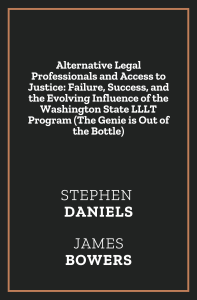The lack of access to competent legal assistance because of the absence of resources, social capital, awareness, or because of geographic distance is described as a justice gap. The existence of this gap is uncontested, and the gap is wide. In response, bar groups, the courts, and academic commentators are giving increasing attention to a range of access-enhancing innovations all of which share a greater role for nonlawyers. This project explores the recent diffusion of one of those innovations, an especially important one, Washington State’s Limited Licensed Legal Practitioner program.
Created in 2012, the Washington State program is the first licensed, mid-level professional authorized by a state to perform certain kinds of “substantive law-related work” without the supervision of an attorney. Since then, a number of other states have looked closely at this innovation for enhancing access. This project examines the origin, development, and characteristics of the Washington State program; and then examines the program’s role in the efforts of eight other states as they considered following Washington State’s approach to enhancing access, with an emphasis on four of those states – the so-called Four Corners States (Arizona, Colorado, New Mexico, and Utah) – that took very different paths.



